As a year into my transition and as a former bodybuilder, my relationship with my body has always been complex. In the gym, I reveled in sculpting muscle and pushing my limits. Now, on this new journey, I’m focused on a different kind of strength—one that starts from within. That’s where collagen supplementation comes in.
Many of you reading this might be familiar with collagen from a beauty standpoint. It’s a buzzword in the skincare world, and for good reason. But collagen’s benefits go far deeper than just plumping wrinkles. It’s the body’s scaffolding, the essential protein that provides structure and support to our skin, bones, joints, and even our hair.
As we age, collagen production naturally declines. This can manifest in a variety of ways, from the appearance of fine lines to aching joints. But for trans women, there’s an additional layer to consider. Hormone replacement therapy (HRT) is a cornerstone of our transition, but it can also impact collagen production.
Here’s where my bodybuilding background comes in handy. When I transitioned, I knew I wanted to support my body in the healthiest way possible. My research led me to collagen supplementation, and the science behind it was compelling.
Studies like the one published in the Journal of the American Medical Directors Association [1] showed that daily collagen supplementation (specifically 2.5 grams) significantly improved knee pain and function in adults with osteoarthritis. Another study published in the Archives of Dermatological Research [2] found that oral collagen supplementation (specific dosage not mentioned in the study) helped improve skin hydration and elasticity in postmenopausal women.
These findings resonated with me. I wanted to not only feel good on the outside but also ensure my body had the building blocks it needed to thrive. Here’s how collagen supplementation has impacted my transition journey:
- Skin Health: HRT can sometimes lead to dryness and changes in skin texture. Collagen supplementation has helped keep my skin hydrated and supple.
- Joint Support: Years of weightlifting can take a toll on your joints. Collagen helps provide lubrication and support, which is especially important as we age.
- Hair Health: Transitioning can sometimes affect hair health. Collagen peptides can contribute to stronger, healthier hair.
It’s important to note that everyone’s body reacts differently. It took a few weeks for me to start noticing a difference, but the change has been gradual and positive.
Choosing the Right Collagen Supplement
The world of collagen supplements can be overwhelming. Here are some things to keep in mind when choosing one:
- Type of Collagen: There are different types of collagen, each with its own benefits. For overall health and skin support, look for supplements containing Type I, II, and III collagen.
- Source: Collagen supplements can be derived from bovine (cow), marine (fish), or porcine (pig) sources. Choose a brand that uses high-quality, ethically sourced ingredients.
- Dosage: Studies suggest a daily intake of 2.5 to 10 grams of collagen can be beneficial. However, it’s always best to consult with your doctor to determine the appropriate dosage for you.
- Form: Collagen supplements come in various forms, like powder, capsules, and even beverages. Choose a form that suits your preferences and lifestyle.
For that extra nutrient boost, stir in a scoop of my favorite collagen powder (affiliate link)—it’s like a secret weapon for your hair, skin, and nails!
Boosting Collagen Through Your Diet
While supplementation provides a concentrated dose, you can also support natural collagen production through your diet. Here are a few collagen-rich foods to consider:
- Bone Broth: Homemade bone broth, simmered from beef, chicken, or fish bones, is a rich source of collagen, as well as other beneficial compounds like glucosamine and chondroitin.
- Fish: Fish with skin, like salmon, offers a good dose of collagen. Additionally, the omega-3 fatty acids found in fish support healthy skin.
- Citrus Fruits: Vitamin C is vital in collagen synthesis. Load up on citrus fruits like oranges, lemons, and grapefruit.
- Berries: Berries are antioxidant powerhouses that fight collagen breakdown and promote healthy skin.
- Egg Whites: Egg whites are a source of proline, an amino acid essential for collagen production.
- Leafy Greens: Dark leafy greens like spinach and kale provide antioxidants and vitamin C, both important for collagen health.
Remember, while eating collagen-rich foods is beneficial, it might not provide the same level of concentrated collagen found in supplements. A balanced approach, combining dietary habits with potential supplementation, is often the best way to support your body’s collagen needs.
Making Collagen a Part of Your Trans Journey
Collagen supplementation is just one piece of the puzzle when it comes to a healthy transition. Here are some additional tips:
- Maintain a Balanced Diet: Collagen production benefits from a diet rich in fruits, vegetables, and lean protein.
- Stay Hydrated: Water is essential for overall health and helps your body utilize collagen effectively.
- Manage Stress: Chronic stress can break down collagen. Find healthy ways to manage stress, like yoga or meditation.
- Get Enough Sleep: Sleep allows your body to repair and rebuild tissues, including collagen.
Transitioning is a marathon, not a sprint. By prioritizing your health from the inside out, you can build a strong foundation for a happy and fulfilling life.
Disclaimer: I am not a medical professional. This article is for informational purposes only and should not be taken as medical advice. Always consult with your doctor before starting any new supplement regimen.


